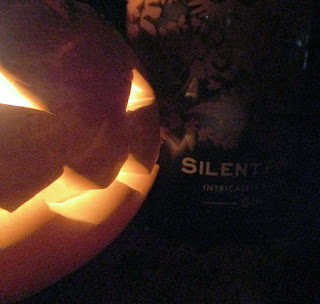At Lamford, they have shut up shop and resorted to online worship only. COVID case rates in that area are nearly twice what they are here, but the hair-raising reports of ambulance queues and escalating infections have made me, and not just me, wobble. Are our churches contributing to national disaster?
Swanvale Halt services are as COVID-compliant as they can be, even if I have to keep reminding people (including myself) not to have social conversations inside the church building, and opening the doors when helpful souls close them 'to keep the warmth in' when of course at the moment that isn't the only thing you keep in. But it's not just the safety of the event: the event is surrounded by ancillary risks, of people moving in and out of a vestry, handling things (not matter how careful they may be), and travelling to and from church. Multiply these risk-events by thousands of churches across the country, and there is almost bound to be some infection arising from them somewhere. If the focus is not on making discrete events tolerably safe, but reducing infection by reducing general interaction, you should shut up everything you can, and in Tier 4 there's precious little left to shut up except worship settings.
The trouble is that this is not a decision about the management of a particular church - as deciding you can't comply with the rules would be - but about public health. It is to say that the Government should be closing churches. If I were them I might well decide to do so, but I'm not. I'm not taking decisions about public health. In this blog I've stressed the vital importance of rule-based orders, societal norms and legal structures over individual preference over and over again: I feel deeply uncomfortable about making my own choices on these matters based on what must surely be arbitrary and very personal factors.
People
are different, and we need people to be different for society to change
and progress. Human difference is an absolute social necessity. It’s also an
uncomfortable necessity because the behaviour that arises from difference is not
necessarily morally neutral and often even when it is it can be couched in
moral terms. For instance, people are more or less risk-tolerant. Most of the time
the effects are marginal, and we can debate whether mountain-climbers are
responsible or whether it’s acceptable to drive faster than the speed limit
safely, without much at stake.
These decisions can have radical consequences but they affect very few people at any one time. During an outbreak of infection, however, everyone is faced by the same situation, and thus everyone has a stake in each other’s behaviour. But this behaviour is still conditioned by personality more than pure reason. Because those differences remain, what may seem to one person to be a rational response to risk appears reckless to another. This is why relying on ‘common sense’ to guide behaviour is problematic: what appears to be ‘common sense’ differs from one person to another, sometimes quite radically. Ultimately there is little that is ‘common’. We end up justifying our own behaviour and by implication criticising the next person’s when, in rational terms, there’s little to choose between them.
This is why, in the current circumstances, we absolutely must set, and stick by, common rules and standards, which means they are settled by Government. Today the Government kept the Tier 4 rules as they are, and the Bishop told me that he couldn't give any positive direction as that would mean being out of step with other dioceses. So I will keep the church open for those that want to use it.
Although I am sort-of off work, we were open today for a quiet midweek mass. At first the readings (1John 2.12-17 and Luke 2.36-40) befuddled me but then I remembered Fr Montgomery-Wright and his description of how the Prayer at the Foot of the Altar, introibo ad altarem Dei, helped him enter into a place where age seemed immaterial, where youth was eternally renewed by the Spirit. So I found myself saying:
1. Here is this character Quintin Montgomery-Wright and what he said.
2. Here is what St John said. Why is he addressing these three groups within the Christian community ('children', 'fathers', 'young people') and what does it say to those of us who are none of them?
3. In fact seen in the eyes of God we are all of them, spiritually, and at different times. However old we might feel, he renews our youth. That's part of what it means, as John says, not to be attached to the world, but to the Spirit.
4. Anna the prophetess discovers the fulfilment of her life right at the end of it, when the longed-for Messiah comes to the Temple and she greets him. God still has work for us all as he renews us day by day!
So that is my last homily for this year, but not, apparently, my last at Swanvale Halt for a while. And, just to round things off, the mower is now working:































